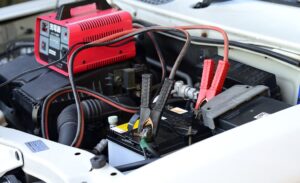Have you ever wondered how long do Chevy Bolt batteries last? Well, you’re in the right place! The lifespan of electric vehicle batteries is one of the most important factors to consider when purchasing a new car. And when it comes to the Chevy Bolt, you’ll be pleased to know that its batteries are built to go the distance. Whether you’re a daily commuter or planning a road trip, the Chevy Bolt’s batteries can keep you moving for longer than you might think. So, let’s dive into the details and explore just how long do Chevy Bolt batteries last.
How Long Do Chevy Bolt Batteries Last?
When it comes to electric vehicles, one of the most common concerns among potential buyers is the lifespan of the battery. After all, the battery is the heart of an electric car, and knowing how long it will last can greatly influence the decision-making process. In the case of the Chevy Bolt, a popular electric vehicle, the battery life is a crucial aspect to consider. In this article, we will delve into the topic of how long Chevy Bolt batteries last, exploring various factors that can affect their lifespan and offering insights into maintenance and care.
Understanding Battery Lifespan
Before we dive into specific details about the Chevy Bolt batteries, it’s important to have a basic understanding of how battery lifespan is determined. Several factors come into play when it comes to battery longevity, including:
– Battery chemistry: Different electric vehicles use different types of batteries, and each battery chemistry has its own lifespan characteristics.
– Charging patterns: The frequency and depth of charging cycles can impact battery degradation.
– Temperature: Extreme heat or cold can affect the performance and lifespan of the battery.
– Maintenance: Regular maintenance and care can help extend the life of the battery.
Now, let’s explore the specific details related to the Chevy Bolt batteries.
Chevy Bolt Battery Specifications
The Chevy Bolt comes equipped with a lithium-ion battery pack, which is a common choice for electric vehicles due to its energy density and overall performance. The battery pack in the Chevy Bolt has a capacity of 66 kilowatt-hours (kWh) and is composed of multiple individual battery cells.
Battery Range
The range of an electric vehicle refers to the distance it can travel on a single charge. The range of the Chevy Bolt varies depending on various factors, such as driving style, weather conditions, and terrain. On average, the Chevy Bolt offers an EPA-estimated range of around 259 miles, which is impressive and allows for everyday commuting without range anxiety.
Battery Warranty
Chevrolet offers a battery warranty for the Chevy Bolt to provide reassurance to owners. The most recent models come with an 8-year/100,000-mile warranty for the battery pack. This warranty covers any defects in workmanship or materials that might arise during normal use.
Factors Affecting Battery Life
The actual lifespan of a Chevy Bolt battery can vary depending on various factors. Here are some key factors that can influence battery life:
Charging Habits
How you charge your Chevy Bolt can impact the longevity of the battery. Here are a few key considerations:
- Avoid frequent deep discharges: It’s recommended to avoid completely draining the battery regularly.
- Use level 2 chargers whenever possible: Level 2 chargers provide a slower and gentler charge, which is better for battery health compared to DC fast chargers.
- Avoid extreme charging practices: Charging the battery to its maximum capacity or leaving it at a very low charge for an extended period can lead to battery degradation.
Temperature
Extreme temperatures, both hot and cold, can have a significant impact on battery life. Here’s what to consider:
- Avoid exposing the vehicle to extreme temperatures: Parking in direct sunlight on hot days or leaving the car in freezing temperatures for extended periods should be minimized.
- Precondition the battery: Chevy Bolt has a feature that allows you to precondition the battery before driving, which helps optimize its performance in extreme temperatures.
Driving Style and Conditions
Driving habits and conditions can also affect the battery life of the Chevy Bolt. Here are a few pointers:
- Regenerative braking: Utilize regenerative braking whenever possible to extend the range and reduce wear on the brakes.
- Smooth acceleration: Avoid aggressive acceleration, as it puts more strain on the battery.
- Limit excessive speed: Driving at high speeds can increase energy consumption and decrease the overall range.
- Consider terrain: Driving on hilly roads or in stop-and-go traffic can impact battery efficiency.
Battery Maintenance and Care
Taking proper care of your Chevy Bolt battery can help prolong its lifespan. Here are some maintenance tips:
- Regular software updates: Ensure that your Chevy Bolt is up to date with the latest software updates provided by Chevrolet.
- Keep the battery charged: Avoid long periods of inactivity with a low battery charge, as it can lead to battery deterioration.
- Maintain optimal tire pressure: Properly inflated tires reduce rolling resistance, which can improve energy efficiency and ultimately benefit the battery life.
- Follow recommended maintenance schedules: Adhere to the maintenance schedule outlined in the owner’s manual to ensure the overall health of your vehicle, which indirectly impacts the battery life.
In conclusion, the Chevy Bolt offers a robust battery pack that can provide a substantial range for daily driving. With proper care and maintenance, the Chevy Bolt battery can last for many years. Factors such as charging habits, temperature, and driving style play a significant role in determining the lifespan of the battery. By following recommended practices and taking proactive steps, Chevy Bolt owners can enjoy their electric vehicle with confidence, knowing that the battery will continue to serve them reliably for years to come.
Frequently Asked Questions
How long do Chevy Bolt batteries typically last?
The average lifespan of a Chevy Bolt battery is around 8-10 years or approximately 100,000 miles, depending on various factors such as driving habits, climate conditions, and proper maintenance.
What factors can affect the lifespan of Chevy Bolt batteries?
Several factors can influence the lifespan of Chevy Bolt batteries, including:
- Driving habits: Aggressive driving, frequent rapid acceleration, and hard braking can put additional strain on the battery, potentially reducing its lifespan.
- Climate conditions: Extreme temperatures, both hot and cold, can affect the performance and longevity of the battery. It’s advisable to park the vehicle in a sheltered or temperature-controlled environment whenever possible.
- Maintenance: Regular maintenance, such as keeping the battery charged within the recommended range and following the manufacturer’s guidelines, can help optimize its lifespan.
Can the lifespan of Chevy Bolt batteries be extended?
While the lifespan of Chevy Bolt batteries is dependent on several factors, there are certain practices that can help extend their longevity. These include:
- Driving conservatively: Gentle acceleration, maintaining steady speeds, and avoiding rapid braking can reduce the strain on the battery and potentially increase its lifespan.
- Keeping the battery charged within recommended levels: Overcharging or frequently discharging the battery to extremely low levels can impact its overall health. It’s best to follow the manufacturer’s guidelines for maintaining the optimal charge level.
- Regular maintenance: Following the recommended maintenance schedule, including battery checks and software updates, can help identify any issues early on and prevent potential problems.
What happens when a Chevy Bolt battery reaches the end of its lifespan?
When a Chevy Bolt battery nears the end of its lifespan, it may experience reduced performance and decreased driving range. At this stage, it is advisable to contact a certified Chevy service center to assess the battery’s condition and determine if a replacement is necessary.
Is there a warranty for Chevy Bolt batteries?
Yes, Chevy Bolt batteries come with a warranty. The warranty coverage may vary depending on the specific model year and location. It is recommended to refer to the official Chevrolet website or consult the vehicle’s documentation for detailed information about the battery warranty terms and conditions.
Final Thoughts
Chevy Bolt batteries are designed to last for an impressive amount of time. On average, the lifespan of a Chevy Bolt battery is around 8 to 10 years or 100,000 to 150,000 miles. This means that drivers can expect their Bolt’s battery to stay reliable and efficient for a significant period. The long-lasting batteries make the Chevy Bolt a practical choice for those seeking an electric vehicle. With the question of “How long do Chevy Bolt batteries last?” answered, it’s clear that these batteries can provide reliable power for years to come.


